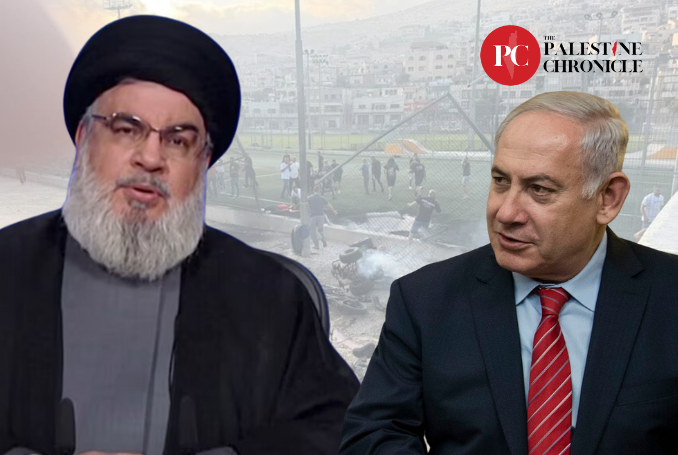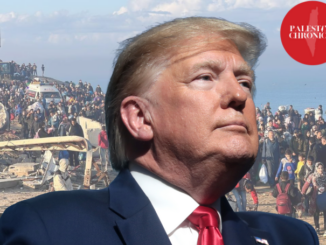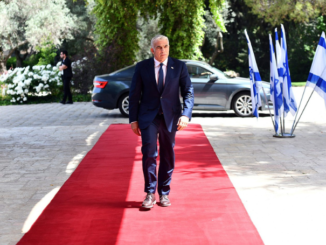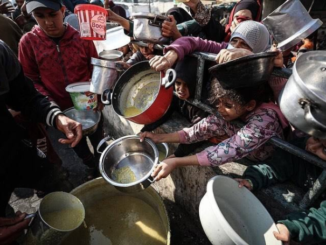
A missile of unknown origin targeted on Saturday a football stadium in Majdal Shams, a village entirely populated by Druze Syrians. The strike resulted in the deaths of at least 11 civilians.
The Lebanese movement Hezbollah has categorically denied any involvement in a deadly strike that hit the village of Majdal Shams in the occupied Syrian Golan Heights, contrary to Israeli claims.
In a statement issued on Saturday evening, the group confirmed “that the Islamic Resistance has no connection to the incident at all, and categorically denies all false allegations in this regard.”
A missile of unknown origin targeted on Saturday a football stadium in Majdal Shams, a village entirely populated by Druze Syrians. The strike resulted in the deaths of at least 11 civilians.
According to the Israeli newspaper Yedioth Ahronoth, the Israeli ambulance service said that 30 people were also injured, including seven critically, due to the rocket, describing the situation as “very tragic.”
The newspaper Israel Hayom reported that an initial investigation revealed difficulties in intercepting the missiles in Majdal Shams with air defense systems.
For its part, the Israeli Broadcasting Corporation cited sources as saying that “Majdal Shams was not prepared for such an attack; its residents were not evacuated and it is not fortified.”
BREAKING: 14 ISRAELIS DEAD AND MORE THAN 20 INJURED BY HEZBOLLAH STRIKE IN MAJDAL SHAMS
This was in Majdal Shams, in the occupied Northern Golan Heights. pic.twitter.com/E4reOZxytI
— Sulaiman Ahmed (@ShaykhSulaiman) July 27, 2024
Dramatic Escalation
Israeli media reported that Prime Minister Benjamin Netanyahu was holding security consultations in Washington after being briefed on the incident in Majdal Shams.
Israel’s Channel 12 quoted an official close to Netanyahu as saying that the attack on Majdal Shams could lead to a dramatic escalation in northern confrontations.
For his part, Israeli Defense Minister Yoav Gallant was also holding consultations with military leaders following the bombing in the Galilee and the Golan.
Channel 12 quoted Foreign Minister Israel Katz as stating that “Hezbollah crossed the red lines.”
Israel Hayom quoted military officials as saying that the response to the Majdal Shams attack “will be broad and we might be forced to consider going to war.”
Hezbollah’s media relations official, Mohammad Afif, told Reuters news agency that he “categorically denied the allegations made by some enemy media outlets about our targeting Majdal Shams.”
Israeli National Union party leader Benny Gantz said that “the time has come to conclude an exchange deal” with the Palestinian Resistance in Gaza “and direct the escalation to the northern front.”
???? DID ISRAEL DO A FALSE FLAG IN GOLAN HEIGHTS?
Majdal Shams is a Syrian city in the Golan Heights, inhabited by Druze, who refused Israeli citizenship and conscription, maintaining their Syrian nationality despite suffering harassment by the Israeli army.
The last major… pic.twitter.com/V7CA903UYR
— Khalissee (@Kahlissee) July 27, 2024
Israeli National Security Minister Itamar Ben-Gvir urged Netanyahu to launch a war on Hezbollah immediately, according to Walla.
For his part, Israeli Finance Minister Bezalel Smotrich said that “it is time to act; Netanyahu must return immediately, and all of Lebanon must pay the price,” calling for the assassination of Hezbollah Secretary-General Hassan Nasrallah in response to the attack.
The Israeli Prime Minister’s Office said that Netanyahu instructed an expedited return from Washington and held initial consultations with his military secretary immediately after the Majdal Shams incident.
Lebanese Prime Minister Najib Mikati’s office condemned the violence against civilians and called for an immediate cessation of hostilities on all fronts.
The American news website Axios cited a US official expressing concern that the Majdal Shams attack could be the spark for a comprehensive war between Israel and Hezbollah, a situation the Biden administration has been trying to avoid during the last ten months.
Heightened Tensions
Since the start of the Israeli war on Gaza, on October 7, the Lebanese movement Hezbollah has engaged directly, but relatively in a limited way in the war against the Israeli occupation.
According to Hezbollah sources, the movement has carried out 1,194 military operations in the first 250 days of war, killing and wounding over 2,000 Israeli soldiers.
Israel has occupied parts of Lebanon for decades and has only left the country in 2000, following stiff Lebanese resistance under Hezbollah’s leadership.
BREAKING: REPORTS INDICATE IT WAS AN IRON DOME INTERCEPTOR MISSILE.
Israeli media reports more than 50 dead and injured in the strike on Majdal Shams in the occupied Northern Golan heights.
Confirmed is 14 dead and 34 injured.
No statement made by Hezbollah.
Hebrew media… pic.twitter.com/GdsS0Q442W
— Suppressed News. (@SuppressedNws) July 27, 2024
It attempted to re-occupy Lebanon in 2006 but failed in what Lebanon considers a major victory against Israel.
Israel, however, continues to occupy parts of Lebanon, namely the Sheeba Farms region.
Hezbollah has vowed to recover every inch of Lebanon that has been occupied by Israel contrary to international law.
(PC, AJA, Al-Mayadeen)









It is obviously the Zionists’ deed. They are unparalleled when it comes to bombing civilian infrastrusture and puting the blame on the resistance axis. This is reminiscent of the bombing of The Baptist hospital in Gaza, when the Zionists falsely blamed Hamas citing a misfired rocketas the cause of the disaster. As if Hamas’ rockets were destructive enough to level a hospital to the ground and kill more than 500 Palestinians at once. Besides, most of the people in Golan are Syrians,so they are of little value to the Zionists and “disposable”. If this is the plan to wage a war against Hezbollah, the end of the Zionist occupation entity, the cancer of the Middle East, is looming in the horizon.
For so many reasons, this was most likely an Israeli strike to initiate war against hezbollah. But American media is covering it as though it was definitely from hezbollah, and as if it were more tragic than the past 10 months in Gaza where tens of thousands have been killed. U.S. media has had a greater influence on this war than any government.mgilmour8@yahoo.com
For so many reasons, this was most likely an Israeli strike to initiate war against hezbollah. But American media is covering it as though it was definitely from hezbollah, and as if it were more tragic than the past 10 months in Gaza where tens of thousands have been killed. U.S. media has had a greater influence on this war than any government.